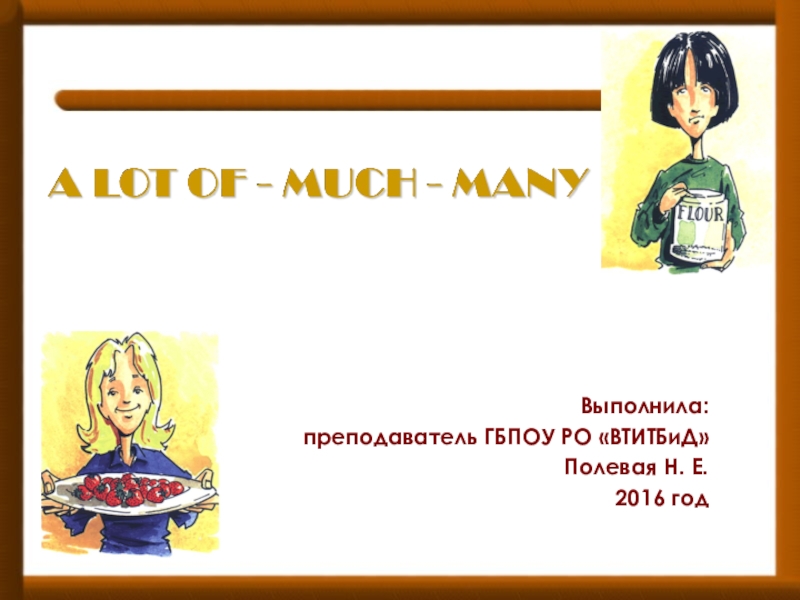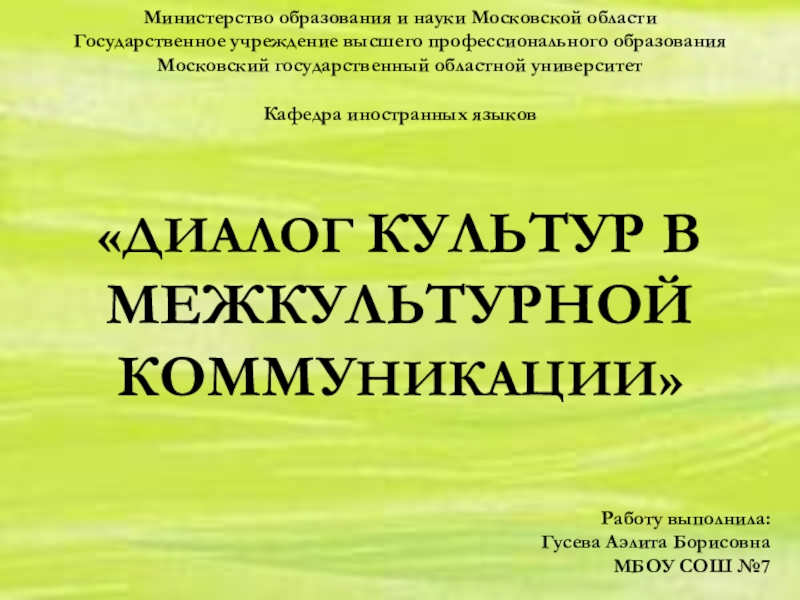- Главная
- Разное
- Образование
- Спорт
- Естествознание
- Природоведение
- Религиоведение
- Французский язык
- Черчение
- Английский язык
- Астрономия
- Алгебра
- Биология
- География
- Геометрия
- Детские презентации
- Информатика
- История
- Литература
- Математика
- Музыка
- МХК
- Немецкий язык
- ОБЖ
- Обществознание
- Окружающий мир
- Педагогика
- Русский язык
- Технология
- Физика
- Философия
- Химия
- Шаблоны, фоны, картинки для презентаций
- Экология
- Экономика
Презентация, доклад к уроку по теме A magical object с применением технологии Object based learning
Содержание
- 1. Презентация к уроку по теме A magical object с применением технологии Object based learning
- 2. A magical objectTask II. Look at the
- 3. Слайд 3
- 4. Слайд 4
- 5. Task III. Watch the presentation. Read the information given in the slides and check your answers.
- 6. The morin khuur or 'horsehead fiddle', is a
- 7. Most of the eastern neighbors of the Mongols possess
- 8. One legend about the origin of the
- 9. Traditionally Mongolian music is made by
- 10. Many festivals are held for
- 11. The instrument can be used for
- 12. Many Mongolians have the instrument in
- 13. In 2008 the morin khuur was inscribed by
- 14. In the Mongolian Gobi farmer's daily
- 15. Task IV. Fill in the table
- 16. Task V. Exchange your opinions on this
A magical objectTask II. Look at the instrument, read the questions, discuss in your groups different variants of answers and choose the best suitable onesToday you will do some research work. For this you should divide
Слайд 2A magical object
Task II. Look at the instrument, read the questions,
discuss in your groups different variants of answers and choose the best suitable ones
Today you will do some research work. For this you should divide into groups.
Task I Listen to the music and guess the instrument
Слайд 5Task III. Watch the presentation.
Read the information given in the
slides and check your answers.
Слайд 6
The morin khuur or 'horsehead fiddle', is a large two-stringed fiddle. It
is the musical emblem of Mongolia.
The neck ends in a carved horse's head. The neck goes through a trapezoid sound box, traditionally covered with an animal skin, which is often painted green and decorated with colorful motives.
Also characteristic of the aesthetic design are the two long pegs for tuning the horsehair strings. Nowadays the sound box is entirely made of wood and sound holes are cut in the soundboard. Synthetic material, is now often used instead of horsehair.
The neck ends in a carved horse's head. The neck goes through a trapezoid sound box, traditionally covered with an animal skin, which is often painted green and decorated with colorful motives.
Also characteristic of the aesthetic design are the two long pegs for tuning the horsehair strings. Nowadays the sound box is entirely made of wood and sound holes are cut in the soundboard. Synthetic material, is now often used instead of horsehair.
Слайд 7 Most of the eastern neighbors of the Mongols possess similar horse hair instruments
(such as the Tuvin igil, the Kazakh kobyz).
It is to be noted that the gusle from Southeastern Europe (Serbia, Croatia & Albania) is a very similar instrument.
It may indicate this is an extremely ancient instrument perhaps dating back to the migration of people out of the Middle East and Central Asia some 40,000 years ago.
Often these instruments are depicted with a goat head instead of a horse in Europe.
It is to be noted that the gusle from Southeastern Europe (Serbia, Croatia & Albania) is a very similar instrument.
It may indicate this is an extremely ancient instrument perhaps dating back to the migration of people out of the Middle East and Central Asia some 40,000 years ago.
Often these instruments are depicted with a goat head instead of a horse in Europe.
Слайд 8
One legend about the origin of the morin khuur is that
a shepherd named Namjil the Cuckoo received the gift of a flying horse; he would mount it at night and fly to meet his beloved. A jealous woman had the horse’s wings cut off, so that the horse fell from the air and died. The grieving shepherd made a horsehead fiddle from the now-wingless horse's skin and tail hair, and used it to play poignant songs about his horse.
.
.
Слайд 9 Traditionally Mongolian music is made by nomadic herders who live
in isolation in the wide-open space. Singing and oral literature have an important place in their culture, and an accompaniment is often provided by a fiddle.
Moreover, the morin khuur, which is a male instrument, is played to accompany dancing and as a solo instrument. The music is inspired by the surrounding nature and the nomads' daily life.
The rhythm often imitates the different horse gaits.
Moreover, the morin khuur, which is a male instrument, is played to accompany dancing and as a solo instrument. The music is inspired by the surrounding nature and the nomads' daily life.
The rhythm often imitates the different horse gaits.
Слайд 10 Many festivals are held for celebrating the importance of
this instrument (biannual "International Morin Huur Festival and competition", which is organized by the "World Morin Huur Association". First held in 2008, second in 2010 - with 8 participating countries (Mongolia, Korea, China, Russia, USA, Germany, France, Japan).
During June the "roaring hooves" festival is held. This is a small festival for professional skilled players - but unfortunately a closed festival. These recordings are often shown in TV reports later.
On the national festival "Naadam" praise songs are played for the most magnificent horse and for the highest ranked wrestler and archer. The songs are called "Magtaal" and accompanied by a unique style of praise and morin khuur.
During June the "roaring hooves" festival is held. This is a small festival for professional skilled players - but unfortunately a closed festival. These recordings are often shown in TV reports later.
On the national festival "Naadam" praise songs are played for the most magnificent horse and for the highest ranked wrestler and archer. The songs are called "Magtaal" and accompanied by a unique style of praise and morin khuur.
Слайд 11 The instrument can be used for playing western style classical
music, or Mongolian style pieces.
The primary education is to learn the scales, to train the ear for achieving the "muscle memory", the ability to automatically adapt the finger position .
The main goal is to achieve a "clear" sound, that means no change in volume or frequency is desired.
The primary education is to learn the scales, to train the ear for achieving the "muscle memory", the ability to automatically adapt the finger position .
The main goal is to achieve a "clear" sound, that means no change in volume or frequency is desired.
Слайд 12
Many Mongolians have the instrument in their home because it
is a symbol for peace and happiness.
During the winter time, but also in beginning of the spring time a morin khuur player is called in for the "жавар үргээх", the "ceremony for scaring away the frost".
A number of folk metal and folk rock bands from Mongolia and the Chinese autonomous region of Inner Mongolia have combined heavy metal and rock music with traditional Mongolian lyrical themes and instruments, including the morin khuur
During the winter time, but also in beginning of the spring time a morin khuur player is called in for the "жавар үргээх", the "ceremony for scaring away the frost".
A number of folk metal and folk rock bands from Mongolia and the Chinese autonomous region of Inner Mongolia have combined heavy metal and rock music with traditional Mongolian lyrical themes and instruments, including the morin khuur
Слайд 13
In 2008 the morin khuur was inscribed by UNESCO on the Representative
List of the Cultural Heritage of Humanity.
In 2015 the MIM received an important donation of a collection of 37 musical instruments from Mongolia.
The donation also included a rich collection of field recordings, records, photos, books concerning these instruments, and Mongolian music in general.
In Darkhan, the city of Mongolia there is a monument to the instrument/
In 2015 the MIM received an important donation of a collection of 37 musical instruments from Mongolia.
The donation also included a rich collection of field recordings, records, photos, books concerning these instruments, and Mongolian music in general.
In Darkhan, the city of Mongolia there is a monument to the instrument/
Слайд 14
In the Mongolian Gobi farmer's daily life the Morin Khuur
has another important use. When a mother camel gives birth to a calf sometimes it rejects her calf due to various natural stress situations and Mongolian camel farmers use Morin Khuur-based melodies called "Khoosloh" to heal mother camels' stress and encourage it to readopt its calf.
This readoption of farm animal practice is widely used in various nomadic civilizations worldwide but for Mongolian Gobi farmers' cases, only this instrument is used on camels.
The practice is well shown on documentary called The Story of the Weeping Camel which nominated for 2005 Academy Award for Best Documentary.
This readoption of farm animal practice is widely used in various nomadic civilizations worldwide but for Mongolian Gobi farmers' cases, only this instrument is used on camels.
The practice is well shown on documentary called The Story of the Weeping Camel which nominated for 2005 Academy Award for Best Documentary.
Слайд 16Task V. Exchange your opinions on this musical instrument using the
information from your table
Homework
Find some information about other folk musical instruments, make the presentation of them and prepare questions to your classmates.





















